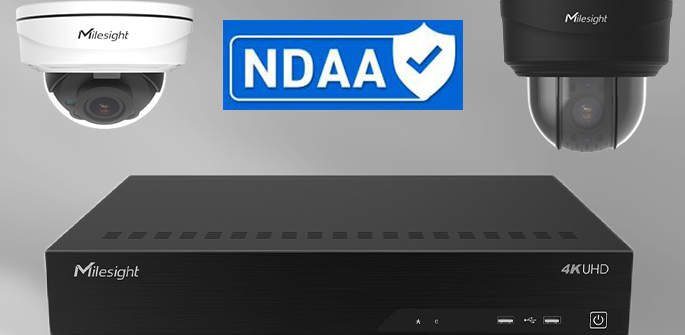It is perhaps undeniable that we all value the concepts of security and safety at any place we go or stay. It’s about leading longer, more fulfilling lives and cherishing quality time with our families in safe and enjoyable environments. Electronic security plays a crucial role in ensuring this experience is achievable and accessible.
In the ever-evolving world of technology, with the rapid rise of complex web applications, real-time artificial intelligence data analysis, and a multitude of hardware vendors worldwide, National Defence Authorization Act (NDAA) compliance serves as a steadfast assurance for procurement departments and, in some way, for savvy private buyers. Over the past three decades, I’ve traversed the dynamic landscape of technology development, observing the evolution of electronic security concepts and solutions. It was a landslide of a myriad of options, hardware and software platforms, methods of system integration, and support. The NDAA policy was introduced by Sen. J. McCain in 2017 to address growing concerns about adversary spying capability in the widely deployed security cameras and recorders. It elevated the burden of overwhelming product ranges with embedded remote access backdoors, causing significant concern to national security, commercial owners, and operators.
Several vendors have recently been flagged for non-compliance with NDAA specifications. For instance, Dahua security cameras are currently undergoing a swift and thorough review process, aimed at refining their designs promptly to address these concerns effectively.
The National Defence Authorization Act (NDAA) certification stands as a gold standard in the security industry, addressing the fact that a particular electronic security hardware and firmware meet rigorous standards set forth by the United States government. The equipment that achieved the stamp of approval of the NDAA certification is a testament to a product’s reliability, security, and compliance with stringent regulations.
To obtain NDAA certification, security systems undergo thorough testing processes to ensure they meet the specified criteria. The testing involves comprehensive evaluations of both hardware and software components. Here are some key aspects that are thoroughly examined during the NDAA certification process:
- Cybersecurity Measures: Vulnerabilities in the software and firmware; effectiveness of encryption protocols to ensure secure data transmission; testing of the ability to withstand potential cyber-attacks.
- Hardware Integrity: Cameras and recorders undergo reliability testing; manufacturing processes are checked for the absence of counterfeit or compromised parts; robustness testing evaluates the resistance of the equipment to physical tampering.
- Supply Chain Security: NDAA compliance requires a transparent and secure supply chain to prevent the use of compromised components; manufacturers must demonstrate the traceability of their products from inception to distribution.
- Data Storage and Accessibility: Security systems are tested for secure data storage and retrieval, preventing unauthorised access; compliance with data retention policies and regulations is verified.
- Third-Party Validation: Independent testing laboratories validate the manufacturer’s claims, providing an unbiased assessment; the existence of vendor R&D processes ensures continuous monitoring and updates that are essential to mitigate evolving security threats.
Benefits of NDAA Certification:
- Government Approval: NDAA-certified security CCTV systems are approved for use in government facilities, ensuring compliance with federal regulations.
- Enhanced Security: Certified systems provide a higher level of security, protecting sensitive information from potential threats.
- Global Credibility: NDAA certification enhances the global credibility of security products, fostering trust among international clients.
The South Korean company Milesight, one of the best suppliers of security products, has been progressively bringing NDAA-compliant security cameras into the market, and nowadays, many system integrators and their customers choose those before anything else. There are quite a few models of High-Definition Milesight security cameras that are NDAA compliant. Along with NVRs the IP cameras are coming with many configurable features including real-time AI, resolution, and comprehensive video analytics options.
The assurance of secure equipment is not just another feature – it’s a necessity. By subjecting products to comprehensive testing, manufacturers offer insights into their security features, testing processes, and supply chain integrity. This transparency builds trust, a cornerstone in the realm of security. This integrity ensures that security is not compromised at any level.
By choosing NDAA-certified security hardware, we’re not just acquiring a product; we’re investing in a comprehensive defence strategy. It’s a friendly assurance that, in the face of challenges, our security hardware is not just up to the task; it exceeds expectations, offering a reliable and trustworthy shield against the uncertainties of today’s world.









